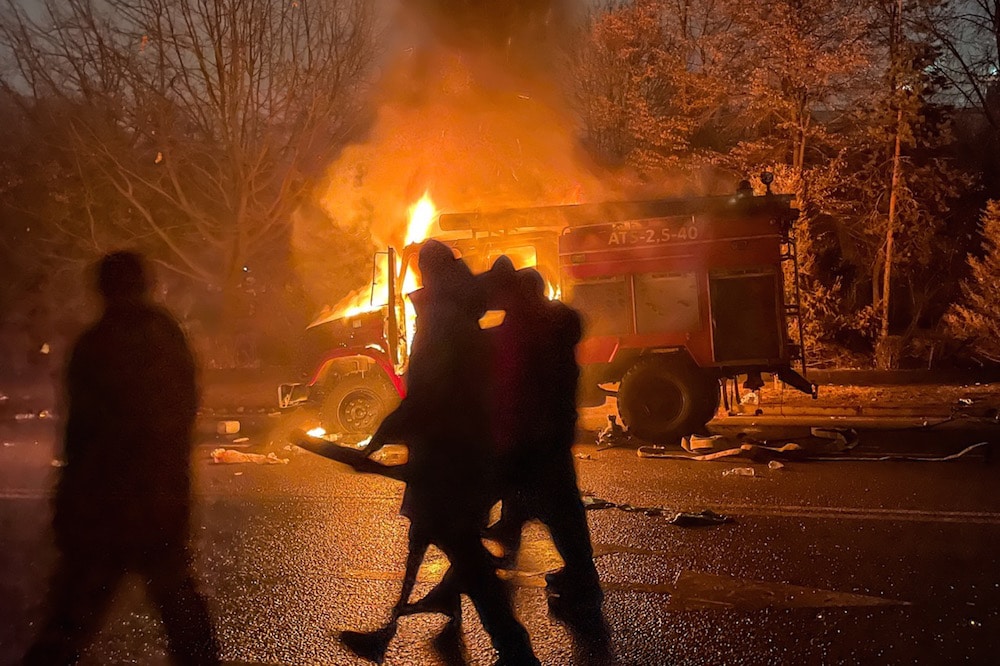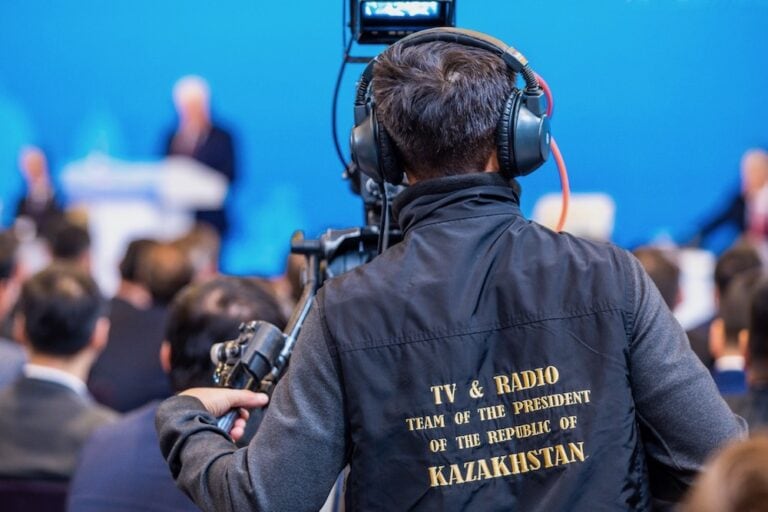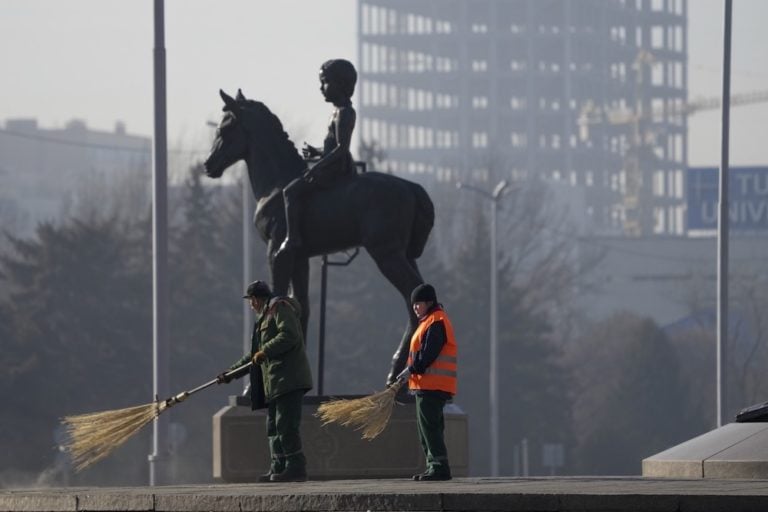IFEX member Adil Soz has compiled a non-exhaustive, chronological list of journalists who found themselves targeted by both rioters and police during the general unrest that has spread across the country.
This statement was originally published on adilsoz.kz
Protests against rising fuel prices began in Zhanaozen, Kazakhstan, on 2 January 2022. In the days that followed, general unrest spread across the country, seeing both peaceful demonstrations and intensely violent clashes. The authorities’ response was heavy-handed and extremely brutal: President Kassym-Jomart Tokayev issued a “shoot-to-kill” order to the security forces and a reported 164 people, including 16 security officers, lost their lives. There were nearly 8,000 arrests. The authorities also blocked the internet for days and cracked down on the press, whom President Tokayev publicly blamed for the unrest. IFEX member Adil Soz has compiled a non-exhaustive, chronological list of journalists who found themselves targeted by both rioters and police during the disturbances.
4 January
Darkhan Omirbek, of the Azattyk radio bureau, was detained in Nur-Sultan, while covering the protests near Asem market. The journalist was released without being given the reason for his detention more than four hours after his lawyer intervened.
Kasym Amanzholov, of the Azattyk radio bureau, was detained in Almaty. He was released after 1.5 hours.
Aizhan Auelbekova, journalist for Vremya newspaper, was detained in Taraz when she was covering an unsanctioned rally. She was taken to the district police station, where she was held for three hours. When she asked about grounds for her detention, she was told: “Because you are a participant in the rally.”
5 January
In general, journalists noted that protesters and police officers maintained the correct attitude towards them on the night of 4-5 January. The situation changed after midday on 5 January – the rioters became aggressive and attacked journalists. Reporters had to remove their PRESS identification vests.
In Almaty, rioters attacked the offices of five TV channels, ransacking and burning the editorial offices of the MIR, Eurasia, Kazakhstan, Khabar and KTK TV channels. None of the employees were hurt.
Also in Almaty, Orda.kz journalists Bek Baytas and Leonid Rasskazov received minor injuries while covering the attack on the Almaty akimat (the mayor’s office) building. Bek Baytas was hit in the face by a flash grenade; Leonid Rasskazov was hit in the back by a rubber bullet.
At around 12.30 PM in Almaty, two journalists from KazTAG news agency were covering a rally at the crossroads of Tole bi Street and Nauryzbay Batyr Street and were attacked by a group of young rioters. The reporters were recording a video of rioters throwing stones at police cars. The rioters did not want to be filmed, and they tried to take and break the video camera, telling the journalists to leave. With the help of peaceful participants at the rally, the journalists managed to get into their car and drive away.
Around noon in Almaty, Vlast.kz photojournalist Almaz Kaisar was making a video of a column of rioters moving eastward along Tole bi Street. The journalist was wearing a PRESS identification vest. He was accompanied by two protesters who ensured his safety. However, soon he was surrounded by about six aggressive young men wearing masks and carrying sticks. They suspected that the reporter worked for the Committee of National Security and that he wanted to film the faces of the protesters so that they would face repercussions later. At first, peaceful protesters tried to defend the photographer, but the number of aggressive rioters grew. They snatched the phone from Kaisar’s hands and smashed it on the ground. After that, the journalist had to take off his PRESS vest and continued his work incognito.
In Atyrau, at around 4PM, Farhat Abilov, an Ak Zhaiyk newspaper reporter, was recording a video of clashes between the rioters and the police, when aggressive bearded men approached the journalist. They used insulting and obscene language, waved their hands, and pushed the reporter, threatening to smash the phone on the ground if he didn’t stop filming.
In Aktau, Saniyash Toiken, an Azattyk radio reporter was covering the rally on Aktau Square, when she noticed a group of men that differed from the rest of the protesters by their unusual behaviour. Bearded men, about 15 in number, stood in the center of the crowd, behaving aggressively, calling for attacks on state institutions. Saniyash approached the group and warned the men that this was an attempt at provocation, similar to the one that happened on 16 December 2011. The bearded men accused the journalist of working for the Democratic Choice of Kazakhstan. Frightened by their aggressive behaviour, the journalist quickly moved away. Later she saw the protesting workers pushing that group away from the center of the crowd.
6 January
In Almaty, Muratkhan Bazarbayev, the driver for the Almaty TV channel reporting team, was killed; the operator of special equipment Diasken Baytibaev was wounded by a bullet in his right hand: two of his fingers had to be amputated. According to Nurzhan Zhalaukyzy, the General Director of the Almaty TV channel: “On 6 January in the evening, they went to make a video on Republic Square. They said that the army had already cleared the area. And when they turned from Al-Farabi Avenue to Furmanov Street, they came under fire.”
7 January
In Uralsk, journalist Lukpan Akhmedyarov was arrested for 10 days on charges of participating in an unsanctioned rally. According to the journalist’s brother, Zhanat Akhmedyarov, Lukpan gave detailed explanations in court that he was not a participant of the rally but a reporter covering it, i.e. he was carrying out his professional work. When protesters began to call for the destruction of a government administrative building, Lukpan, as a responsible citizen, could not keep silent and urged the protesters not to fall for provocation. He recorded his words on his Smartphone. The court did not take into account either the recording, or the testimony of the witnesses.
9 January
In Aktobe at 11.00 PM, police presented a warrant and searched the apartment of freelance journalist for Orda.kz, Ardak Erubaeva. After that the journalist was taken to the regional police department. According to Ardak, she was interrogated about her posts on social networks. Two hours later police brought her home, imposing no restrictions on her.



